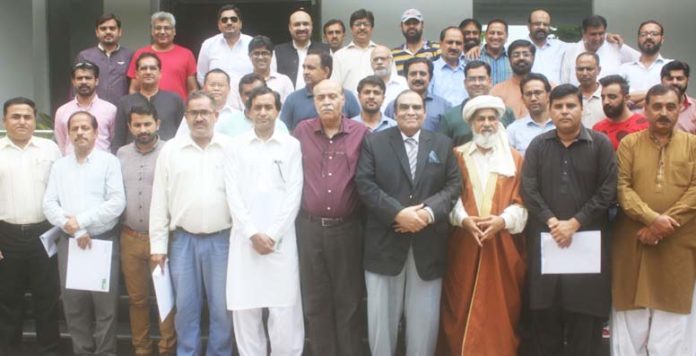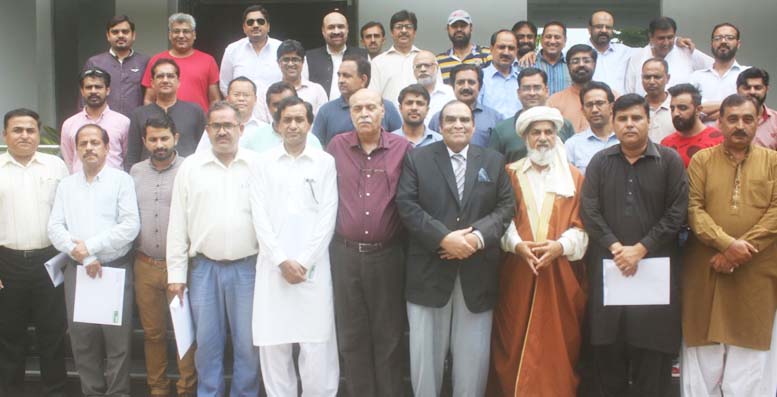Lahore (Muhammad Yasir) Pioneer in introducing high yielding hybrid varieties of coarse rice, Guard Agriculture Research and Services Private Ltd. (GUARD) has now focused to develop a hybrid of ‘Basmati’ rice with an average per acre yield of 80 maunds and average grain length of 8mm and above.
‘We are very near to achieve our targets after a hard work of five to six years. Our scientists in collaboration with the Chinese partners have developed 13 CMS lines out of which one variety is giving 75 maund per acres and average grain length of 7 mm, slightly short of the target of 80 maund per acre,’ said Chief Executive Guard Agri Shahzad Ali Malik.
Members of the Agriculture Journalists Association (AJA) and Lahore Economic Journalists Association (LEJA) visited Guard head office here on Monday to know the role of hybrid rice varieties in ensuring food security. SAARC Chamber of Commerce & Industry Vice President Iftikhar Ali Malik, LCCI President Syed Almas Hyder, Rice Exporters Association of Pakistan’s nominated chairman for next year Shahjahan Malik and Pir Nazim Hussein Shah were also present on this occasion.
Malik said that scientists have been given the task that the variety they develop should be heat & drought tolerant and salinity resistant. He said that Guard started working on the development of basmati hybrid in 2014 and after six years of industrious research is near its target.
Established in 1989, Guard is involved in basic as well as applied research for the development of hybrid rice varieties in collaboration with Longping High-Tech Industries and have achieved full technology transfer in the field of hybrid rice with a feather, of being market a leader in hybrid rice seed, in its cap, he said
Guard commercialized Super Basmati in 1991, which was eventually approved by Government in 1997 for commercial cultivation after 40 per cent of Punjab area came under its cultivation. The Company so far has developed 08 different rice hybrids for general cultivation in Pakistan with first Seed Company developing such a big number of hybrids and starting local hybrid seed production.
He said that since the introduction of hybrid rice in Sindh, the income of rice farmers has doubled due to the double yield of hybrid rice as compared to IRRI varieties. Due to early maturing hybrid rice crop, timely sowing of Rabi crops is ensured. Timely sown Rabi crops give positive and significantly increase in per-unit production / per acre yield which consequently increases farmer income. Due to shorter maturity period, hybrid rice crop can be planted in late season.
He said need to bring new hybrid rice is that yield of existing rice varieties is low and stagnant. The low rice yields do not match with the increasing cost of inputs and because of increasing cost, Pakistan is becoming uncompetitive in the international market. Declining land resources and water shortage are other reasons which can only be solved by the adoption of hybrid rice.
Shahzad said that they were also introducing combine harvesters, rice transplanters and other implements to promote mechanization in this field and these will be introduced to farmers on rental basis. He lamented that our public institutes could not introduce any new variety since 1960.
To a question, he said to encase upon the opportunities exist in Iran, which is the second biggest market of Basmati rice after Saudi Arabia, Pakistan needs to protect the rice exporters. He said as we do not have any cash swap treaty with Iran, exporters have proposed barter trade with Iran. He hoped that soon Pakistan will have a barter agreement with Iran of importing LPG against Pakistani rice.
He said there is a need of more production and supply to explore new markets and achieve the target of US 5 billion dollars export in the next five years and hybrid seeds can give this more yield. He said that he personally is opposed to the idea of introducing GMOs in food crops.
Chairman GUARD Group Iftikhar Ali Malik speaking on this occasion said that efforts of his company had ensured over 100 per cent increase in production of rice in Sindh and hoped that research in Punjab would yield the same results. He said that we need more yield due to increasing mouths to feed, consuming fewer resources for more production to ensure a positive environmental impact.
Lahore Chamber of Commerce & Industry (LCCI) President Syed Almas Hyder appreciated the efforts being carried out by the Group and said that no other public or private group was doing the same. He said our industries are also dependent on agriculture and they perform well when agriculture performs well.







